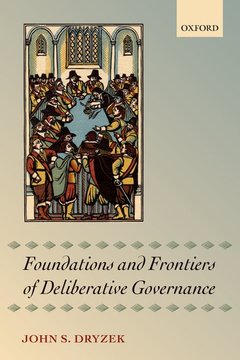Description
Foundations and Frontiers of Deliberative Governance
Author: Dryzek John S.
Language: English
Subject for Foundations and Frontiers of Deliberative Governance:
Publication date: 03-2012
256 p. · 15.5x23.4 cm · Hardback
256 p. · 15.5x23.4 cm · Hardback
Description
/li>Contents
/li>Biography
/li>
Deliberative democracy now dominates the theory, reform, and study of democracy. Working at its cutting edges, Foundations and Frontiers of Deliberative Governance reaches from conceptual underpinnings to the key challenges faced in applications to ever-increasing ranges of problems and issues. Following a survey of the life and times of deliberative democracy, the turns it has taken, and the logic of deliberative systems, contentious foundational issues receive attention. How can deliberative legitimacy be achieved in large-scale societies where face-to-face deliberation is implausible? What can and should representation mean in such systems? What kinds of communication should be valued, and why? How can competing appeals of pluralism and consensus in democratic politics be reconciled? New concepts are developed along the way: discursive legitimacy, discursive representation, systemic tests for rhetoric in democratic communication, and several forms of meta-consensus. Particular forums (be they legislative assemblies or designed mini-publics) have an important place in deliberative democracy, but more important are macro-level deliberative systems that encompass the engagement of discourses in the public sphere as well as formal and informal institutions of governance. Deliberative democracy can be applied fruitfully in areas previously off-limits to democratic theory: networked governance, the democratization of authoritarian states, and global democracy, as well as in new ways to invigorate citizen participation. In these areas and more, deliberative democracy out-performs its competitors.
Preface. PART I Introduction. 1. Deliberative Turns. PART II Foundations. 2. Legitimacy. 3. Representation. 4. Communication And Rhetoric. 5. Pluralism And Meta-Consensus. 6. Governance Networks. 7. The Democratization of Authoritarian States. 8. Mini-Publics and Their Macro Consequences. 9. Global Politics. Part IV Conclusion. 10. Integrated Foundations and Long Frontiers. Bibliography. Index.
John Dryzek is a Fellow of the Academy of Social Sciences in Australia, former Head of the Departments of Political Science at the Universities of Oregon and Melbourne and the Social and Political Theory Program at ANU, and former editor of the Australian Journal of Political Science. Working in both political theory and empirical social science, he is best known for his contributions in the areas of democratic theory and practice and environmental politics. One of the instigators of the 'deliberative turn' in democratic theory, he has published four books in this area with Oxford University Press, Cambridge University Press, and Polity Press. His work in environmental politics ranges from green political philosophy to studies of environmental discourses and movements, and he has published three books in this area. He is Australian Research Council Federation Fellow and Professor in the Centre for Deliberative Democracy and Global Governance at the Australian National University.
© 2024 LAVOISIER S.A.S.
These books may interest you

Deliberative Global Governance 26.38 €



